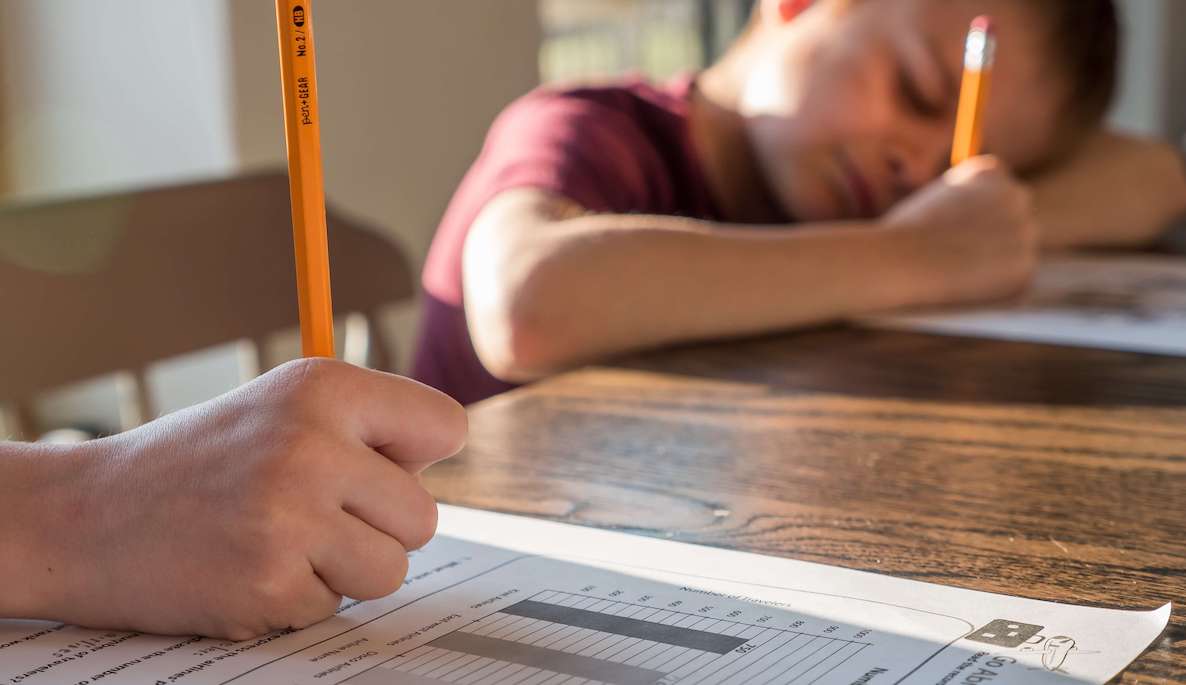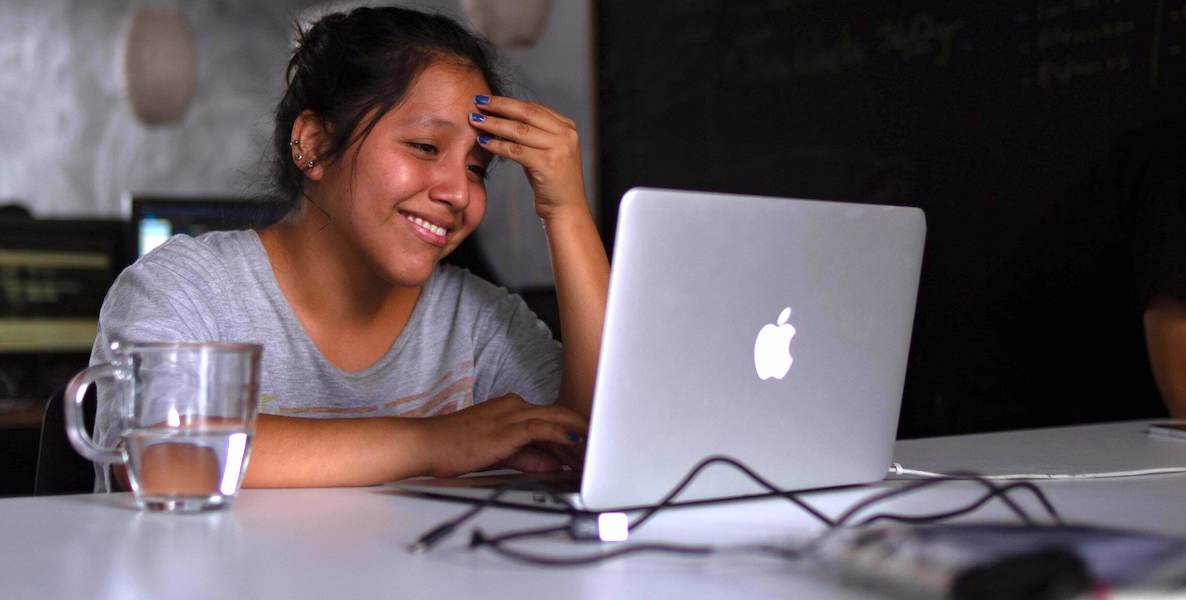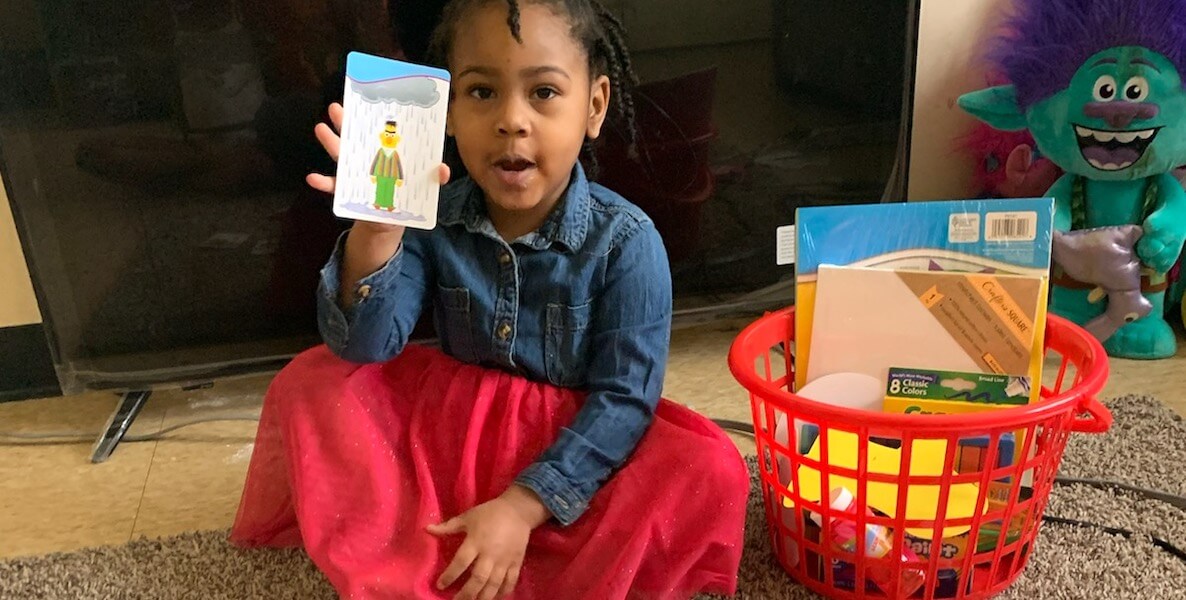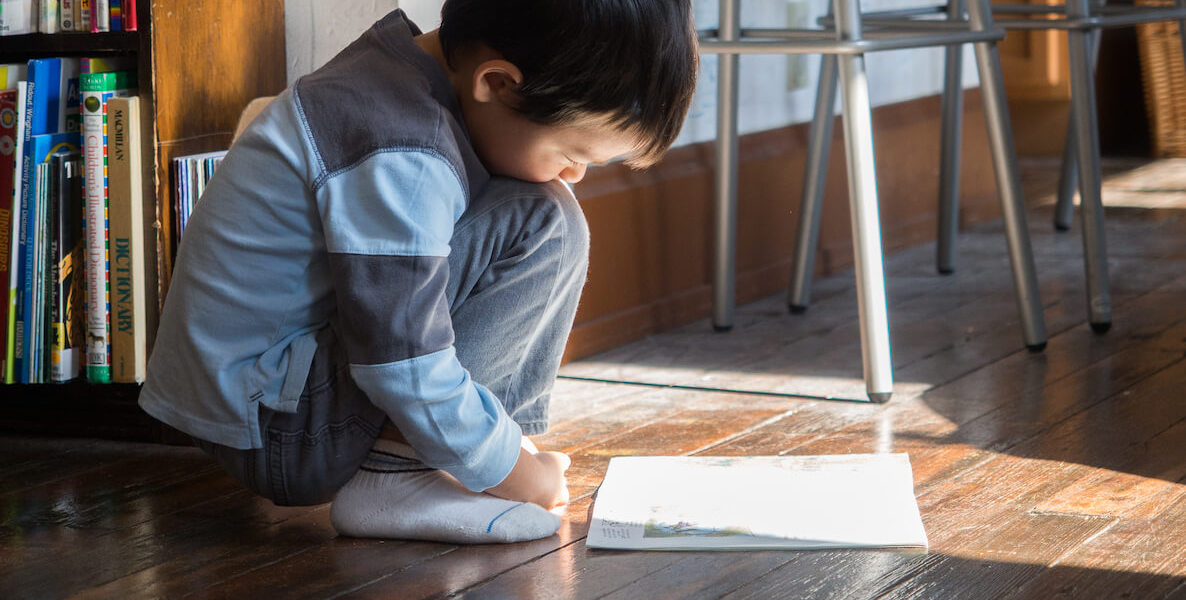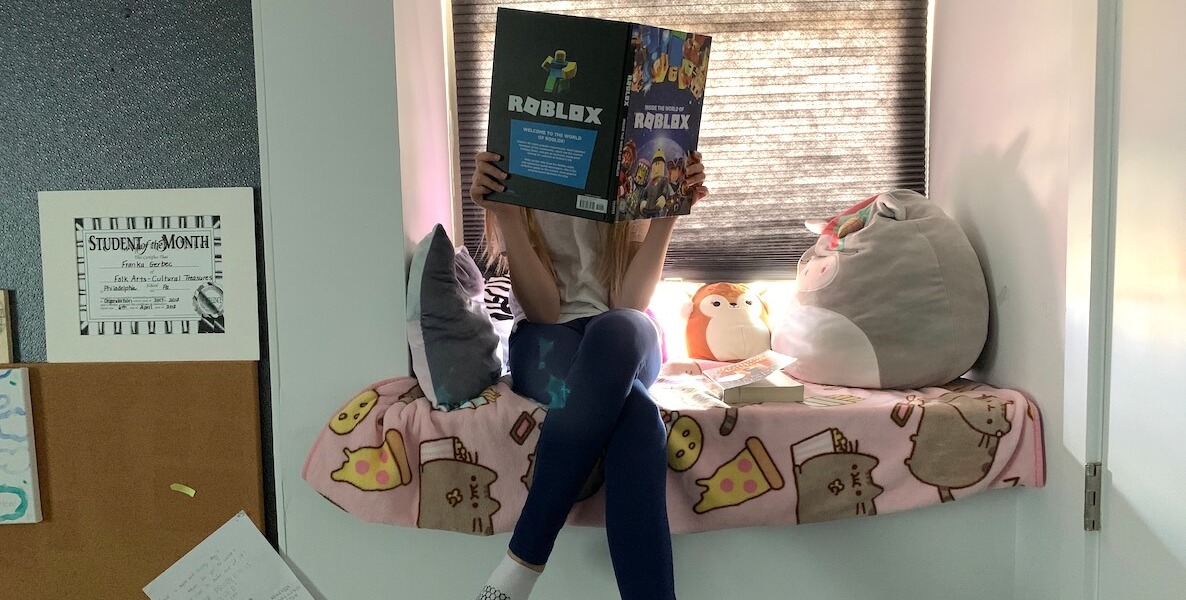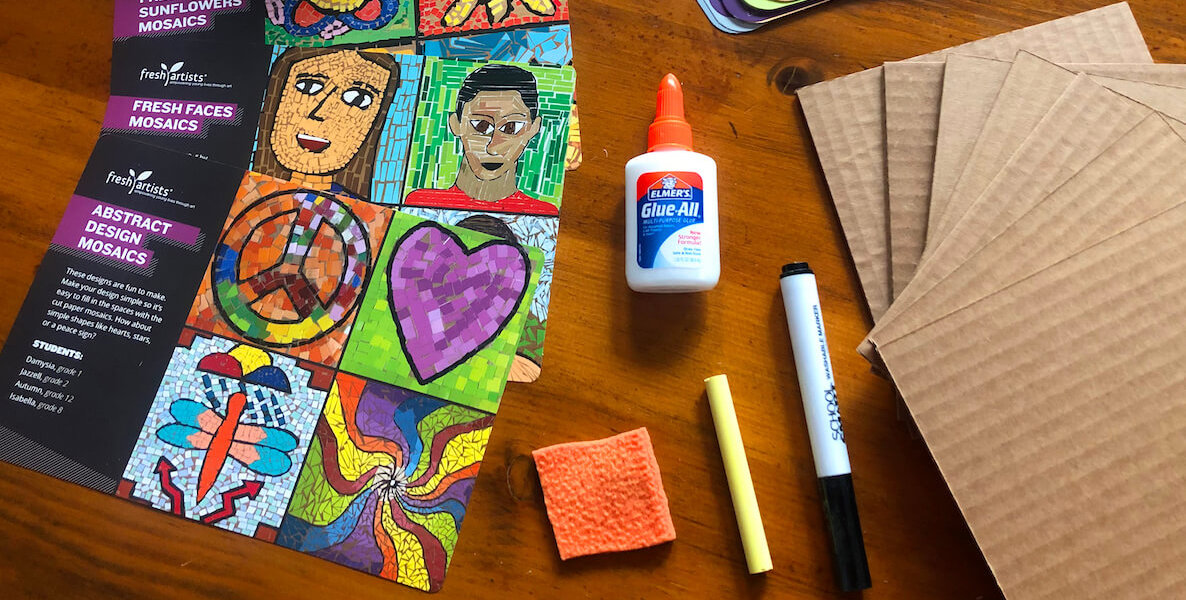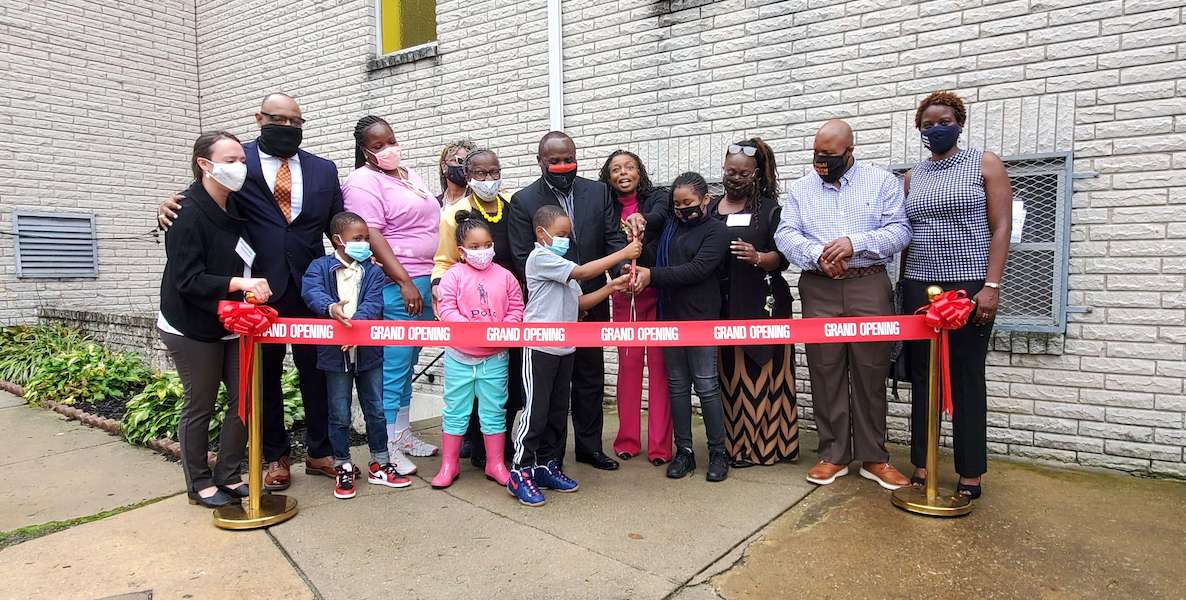Like every parent trying to keep it together during the pandemic, Jasmine Gholston felt particularly overwhelmed when the new school year began, virtually, for her five-year-old daughter.
While she spent long days cleaning homes and offices, Gholston had to ask her mother to watch her daughter, or turn down work when that wasn’t an option.
“It’s hard, because you don’t want your child everywhere during a pandemic,” she says.
So Gholston felt a huge sense of relief when she heard that the church nearby, Bible Way Baptist Church on N. 52nd Street in West Philly, would be the pilot site of a new pod for neighborhood children in kindergarten through fifth grade.
![]() Talking via phone on her drive from work to pick up her daughter from the pod last Friday, Gholston said that since the pod opened on October 13th, “It’s like a weight off my shoulders that she has somewhere to go that she actually likes. It just makes life so much easier.”
Talking via phone on her drive from work to pick up her daughter from the pod last Friday, Gholston said that since the pod opened on October 13th, “It’s like a weight off my shoulders that she has somewhere to go that she actually likes. It just makes life so much easier.”
Gholston had been wary at first—“I don’t trust just anyone with my baby,” she says, echoing a sentiment familiar to all parents of young kids—but her daughter looks forward to going every day. “I think the biggest issue she’s faced so far was not being able to get the purple hula hoop.”
A small child enabled to have a small, childlike frustration at a time like this? How utterly refreshing.
A long time coming …
For those who haven’t been following the pandemic-fueled national education crisis and the new lexicon that’s arisen to describe features of it, “pods” are small groups of students overseen by an adult who can help facilitate online learning, and they’ve become increasingly common—and divisive—among parents who can afford the luxuries of both hiring this kind of specialized childcare, and providing safe spaces for them to convene.
The pod where Gholston brings her daughter every day, however, is not only free, but staffed by professional instructors at a five-to-one child-to-adult ratio, as well as a trained behavioral therapist who’s on site to support children and their caregivers.
And it’s the result of months of work from a community group called Philadelphia Community Stakeholders, or PCS.
PCS was co-launched just over four years ago by Ryan N. Boyer of Laborers’ District Council and Sam Staten Jr. of The Laborers’ International Union of North America (LIUNA) Local Union #332.
They brought together a cross-section of African-American leaders and activists from a range of sectors—business, education, nonprofit, media, elected officials—to focus on improving the quality of life for the African-American community in Philadelphia.
PCS’s executive committee includes Boyer, Staten, Sylvester Mobley, founder of Coded by Kids, Dawn Chavous, founder and president of Chavous Consulting (who last month filed to have the pending case against her and her husband, Councilmember Kenyatta Johnson, thrown out), attorney George R. Burrell, and Sandra Dungee Glenn, a lifelong public servant who, among other roles, sat on the Philadelphia School Board and held the CEO post at The Harambee Institute of Science and Technology Charter School for nearly four years.
![]() Since its launch, PCS has been addressing issues with state and local administrations, with a focus on policy. “What can we do to advance a policy that would better promote community responses to gun violence? What can we do around access to quality housing? How do we increase access to mental and behavioral health services? Those have been some of the things we’ve worked on in the past,” Dungee Glenn explains.
Since its launch, PCS has been addressing issues with state and local administrations, with a focus on policy. “What can we do to advance a policy that would better promote community responses to gun violence? What can we do around access to quality housing? How do we increase access to mental and behavioral health services? Those have been some of the things we’ve worked on in the past,” Dungee Glenn explains.
Then, Covid hit. “And pretty quickly, it became clear that the Black community was being hit disproportionately hard—the rates of infection, the issues related to job loss, business closures,” Dungee Glenn says.
PCS decided to dig into two main areas. First, they allied themselves with the Black Doctors Covid Consortium, taking on the issue of access to testing, and advocating to the Kenney administration and the Governor’s office to get more funding so that they could expand their testing program.
Next, they turned to education—an issue that’s particularly close to Dungee Glenn’s heart, given her work history. Black children, she knew, were at an even greater risk of facing a Covid slide.
“Pretty quickly, it became clear that the Black community was being hit disproportionately hard—the rates of infection, the issues related to job loss, business closures.”
According to an analysis from McKinsey & Company, the average student could fall seven months behind academically, while Black and Latino students could experience even greater learning losses, equivalent to 10 months for Black children and nine months for Latino students.
“What was resonating with me was that hundreds of hours of instructional time were being lost. And so whatever the problems were before, now magnify them ten-fold,” she says.
Dungee Glenn, with support from Chavous, brought colleagues and Black leaders in education around the table to brainstorm a response. They put together a team including Mobley, Dr. Malika Savoy-Brooks, chief of academic support for the School District of Philadelphia; Dr. Anthony Irvin, director of urban education for the Archdiocese of Philadelphia; Dr. Naomi Johnson-Booker, CEO and founder of Global Leadership Academy Charter School and a founding member of the African American Charter School Coalition (AACSC); Sharif El-Mekki CEO of the Center for Black Educator Development; Donna Frisby-Greenwood, CEO of The Fund for the School District of Philadelphia; and Dr. Cassandra Jones, CEO at Next Steps Associates and former Chief Academic Officer with the SDP.
“We came around the table and just said: What can we do?”
Listening to the people
First up: a listening tour.
The group decided to step back and find out which needs were most pressing. Four state senators—Anthony Hardy Williams, Vincent Hughes, Art Haywood, Sharif Street —supported a series of telephone town halls, an outreach effort that reached 4,300 households in Philadelphia.
“We heard directly from parents and caregivers about their needs,” Dungee Glenn says. Trends emerged: Parents had to return to work, and they needed a safe place for their children to do virtual learning. Grandparents who were caregivers needed help navigating technology, from Zoom to ClassDojo. And both caregivers and students needed social-emotional support.
“When we put those things together—closing the gap, social and emotional needs, supporting parents, and a safe place for virtual learning—that became the model for what has become the Philadelphia Community Stakeholders Learning Pod and Parent Resource Center.”
But: Before its doors could open, the Pod needed funding.
That’s where Frisby-Greenwood, of The Fund For School District of Philadelphia, was particularly instrumental.
Fueling change
Among its other initiatives, The Fund for the School District of Philadelphia strives to connect donors who want to support public education and students in public schools with opportunities to do so.
“So one of the first things I did was have PCS present to Philanthropy Network Greater Philadelphia,” explains Frisby-Greenwood. “I knew it would be the best way to get them in front of a larger group, as opposed to us going to each individual foundation and asking for help.”
![]() Her instincts were right: Immediately after that meeting, Patricia Kind Family Foundation stepped up. “They provided the initial funding that was needed to get us started and help us to attract other donors,” Frisby-Greenwood explains.
Her instincts were right: Immediately after that meeting, Patricia Kind Family Foundation stepped up. “They provided the initial funding that was needed to get us started and help us to attract other donors,” Frisby-Greenwood explains.
Support also came from Goldenberg Group’s People Helping People Foundation, who served as the group’s “facility partner” and helped to underwrite all costs associated with outfitting the space (and helped secure additional financial and in-kind support), West Philadelphia Financial Services Institute, and an anonymous donor, with in-kind contributions also coming from ShopRite Supermarkets operated by the Brown Family , Cisco Systems, Inc., The Four Seasons Hotel Philadelphia, West Powelton Development Corporation (WPDC), and The Archdiocese of Philadelphia.
Of course, the group also needed a safe place to host the pod. And as the Philly stars can sometimes align, right as Frisby-Greenwood was thinking about calling The Goldenberg Group—the mission-driven real estate development company with which The Fund had previously worked on other initiatives—they reached out to her.
“The situation isn’t hopeless, and we’re not helpless as a community. And that’s what we are proving through this pod,” Dungee Glenn adds.
“They called me and said We want to do something to help the kids going back to school. What can we do? And I said ‘I have the perfect thing!’”
Bible Way Baptist Church became the site, with The Goldenberg Group outfitting the space to suit students’ needs. They built walls, figured out the air circulation and air purification needs to address Covid-19, determined air- and walk-flow, painted, secured furniture, and worked with the church to ensure the opening, closing, maintenance, and preparation of the site; they also brought in Walls for Justice, which painted the pod’s outdoor sign and portions of the interior as well.
Now, it can serve three groups of 10 students, with two instructors assigned to each group, a behavioral health therapist who is embedded with the pod to observe children and work with families, a full-time program coordinator who is a liaison with parents and oversees the pod’s parent resource center, and a full-time site director who oversees the day-to-day operations and provides support for all staff and programming—notable points of differentiation from the city-run Access Centers.
It’s open five days a week, Monday through Friday, 7:30am to 4:30 pm. Any child in Philadelphia is eligible to come, though priority is being given to children in the immediate neighborhood.
“Every morning, they’re so welcoming when we get there,” Gholston says. “The overall experience has just been great.”
Scaling the solution
PCS has an evaluator on board, someone whose job it is to document and collect data to show the difference this kind of environment can make for students. They have enough funding to keep the pod going through the end of the calendar year, but are hoping to generate more, to keep it open through the academic year, and ideally replicate it. (It costs approximately $40,000 per month to run the pod.)
“We know that there are thousands of children who could benefit from this,” Dungee Glenn says.
And, she adds, the anecdotal evidence is already quite clear.
“This should be part of the educational ecosystem all the time.”
“For example, one of our students had not logged into her math class until she started with us—we’re in October and this was the first time she logged into math! We know that one of our kindergarteners, because of having to go to the virtual learning in March, never finished learning her alphabet. And so now she’s in first grade but doesn’t have the fundamentals for reading. So we’re working on that with her. We know of a family who just relocated from North Carolina who did not know how to get their children signed into school, so we’re working with that family to get their children registered,” she says. “Our program coordinator is talking to these families every day, and our therapist is already doing follow-up with families.”
“The situation isn’t hopeless, and we’re not helpless as a community. And that’s what we are proving through this pod,” Dungee Glenn adds. The aspect about which she’s most proud: “It’s been through the community that it has come into being.”
El-Mekki agrees. “I think this is a true sankofa moment,” says the beloved former principal and educator and the powerhouse behind The Center for Black Educator Development. He’s referring to the Twi phrase, from Ghana, that translates to “Go back and get it.”
“The leadership of PCS didn’t just say ‘Hey this needs to happen’ and go about it arbitrarily. They looked at how our ancestors addressed it,” he explains.
He notes the schools that popped up after emancipation, and the Freedom Schools that were started by Charlie Cobb as part of SNCC, and the Black Panther Party’s Liberation Schools. “All of these were responses. And so this is kind of an ubuntu moment, where we’re all connected, as well as this idea of sankofa, that speaks to looking backwards in order to move forward.”
Rallying the community—organizing people and resources—is how you change conditions, El-Mekki stresses. And there’s no good reason why this kind of community resource shouldn’t exist in post-pandemic times, too. “I’m hoping that this becomes part of the normal again. Where […] there are always community resources to support children and address needs. This should be part of the educational ecosystem all the time.”



